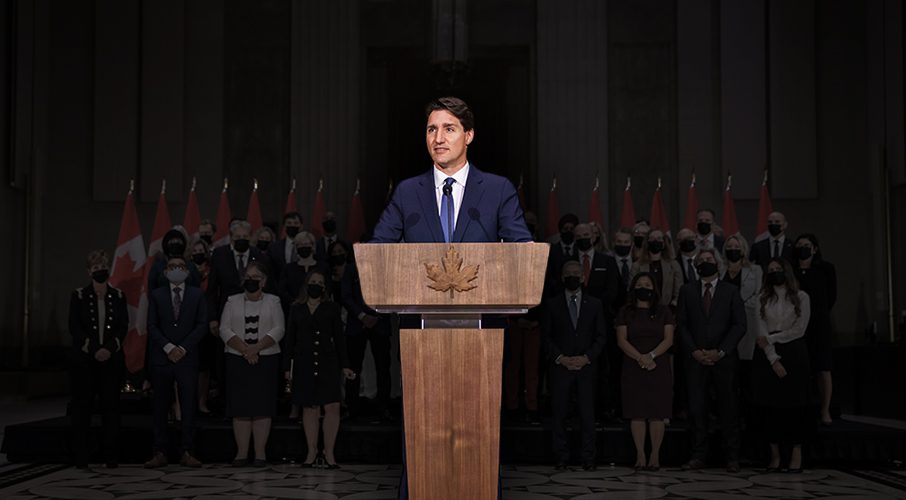This article originally appeared in the Western Standard.
By Peter Menzies, January 26, 2024
The most progressive government in Canada’s history – the one under the towering command of Prime Minister Justin Trudeau – is fast building a reputation as the least liberal administration to have ruled the nation.
Just ask no less a personality than Piers Morgan.
“If you take Trudeau, for example, he banged on about Trump being a fascist, when he is the number one woke fascist in the world,” the English broadcaster and TV presenter recently told America’s Fox News. “The most woke human being alive.”
There’s little question Trudeau’s image as the world’s postmodern Prince Charming took a sharp turn for the worse two years ago with the unprecedented invocation of the Emergencies Act to suppress anti-government protests.
What’s more unsettling for civil libertarians is the thought that the Emergencies Act invocation wasn’t an aberration but part of a pattern of behaviour indicating that, while the ruling party may be Liberal, its instincts are anything but.
Its determination to control media – a hallmark of authoritarianism – has certainly raised eyebrows.
The Online Streaming Act, for instance, was only supposed to be about getting “money from web giants” such as Netflix and Disney+ to ensure government-preferred Canadian film and television content continued to be produced. But the act gave the Canadian Radio-television and Telecommunications Commission (CRTC) sweeping powers over any audio or video content published on the internet, even including podcasts.
Fears were also raised that YouTube and TikTok would be forced by the CRTC to give preferential treatment to its approved content over that produced by those not subscribing to regulatory and Canada Media Fund expectations. The fact the CRTC is involved has further raised fears about the potential for a wave of censorship.
The regulator insists that it does not engage in censorship. But the fact it was doing exactly that – sanctioning Radio Canada for using the N-word and banning RT (Russian State television) while swearing that it wasn’t a censor – didn’t build public confidence in the credibility of its protestations.
When the CRTC accepted a complaint from Egale Canada (a 2SLGBTQI advocacy group) asking that it remove Fox News from its list of approved foreign broadcasters for “repeatedly and regularly” violating broadcasting standards, it was clear that the CRTC is open to making decisions on what Canadians may or may not watch. In other words: censorship. The Commission is composed of a chair, two vice chairs and six regional commissioners, each of whom is appointed by cabinet.
The government has also broken new ground by involving itself in the business of judging the journalistic bona fides of news organizations. Two programs initially announced as temporary – the Local Journalism Initiative and the Journalism Labour Tax Credit – have now doubled in size and appear to be permanent. A government-appointed panel decides which organizations are Qualified Canadian Journalism Organizations (and which aren’t). And while all involved insist the panel functions independently, it nevertheless reports to the Heritage Minister who reports to the Prime Minister’s Office which reports to a prime minister who appears obsessed with the need to control “misinformation” and “disinformation.”
That issue could very well be at the heart of what could become the Trudeau government’s most illiberal legislation yet – the Online Harms Act.
First promised in 2019 to ensure a suite of already-illegal behaviours including child porn and terrorism recruitment were suppressed, the Act’s core concept of giving a Digital Safety Commissioner power to order swift content removal has met with stiff resistance.
Pre-Elon Musk Twitter (X) put it this way:
“People around the world have been blocked from accessing Twitter and other services in a similar manner as the one proposed by Canada by multiple authoritarian governments (China, North Korea, and Iran for example) …”
Three Heritage Ministers have failed to find a way to legally reign in the internet in a fashion that satisfies the prime minister, so the matter has passed to the hands of Justice Minister Arif Virani.
Speculation in Ottawa is that Virani may be named as a Minister of State for Heritage, permitting him to try to come up with legislation that won’t – as did the Online Streaming Act and the Online News Act – trigger outrage when it’s introduced in the spring.
It remains to be seen if the Act will include extreme measures, like the policy resolution passed at last May’s Liberal convention to ban online media from using unnamed sources.
So, strap yourself in. The curtain may be about to rise on the most illiberal Liberal move yet.






